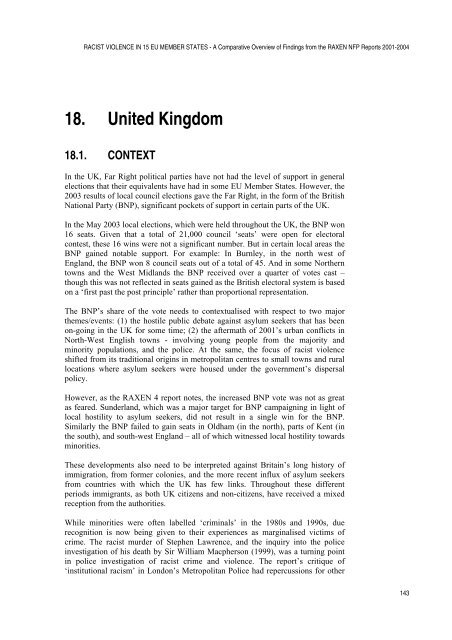RACIST VIOLENCE IN 15 EU MEMBER STATES - Cospe
RACIST VIOLENCE IN 15 EU MEMBER STATES - Cospe
RACIST VIOLENCE IN 15 EU MEMBER STATES - Cospe
You also want an ePaper? Increase the reach of your titles
YUMPU automatically turns print PDFs into web optimized ePapers that Google loves.
<strong>RACIST</strong> <strong>VIOLENCE</strong> <strong>IN</strong> <strong>15</strong> <strong>EU</strong> <strong>MEMBER</strong> <strong>STATES</strong> - A Comparative Overview of Findings from the RAXEN NFP Reports 2001-2004<br />
18. United Kingdom<br />
18.1. CONTEXT<br />
In the UK, Far Right political parties have not had the level of support in general<br />
elections that their equivalents have had in some <strong>EU</strong> Member States. However, the<br />
2003 results of local council elections gave the Far Right, in the form of the British<br />
National Party (BNP), significant pockets of support in certain parts of the UK.<br />
In the May 2003 local elections, which were held throughout the UK, the BNP won<br />
16 seats. Given that a total of 21,000 council ‘seats’ were open for electoral<br />
contest, these 16 wins were not a significant number. But in certain local areas the<br />
BNP gained notable support. For example: In Burnley, in the north west of<br />
England, the BNP won 8 council seats out of a total of 45. And in some Northern<br />
towns and the West Midlands the BNP received over a quarter of votes cast –<br />
though this was not reflected in seats gained as the British electoral system is based<br />
on a ‘first past the post principle’ rather than proportional representation.<br />
The BNP’s share of the vote needs to contextualised with respect to two major<br />
themes/events: (1) the hostile public debate against asylum seekers that has been<br />
on-going in the UK for some time; (2) the aftermath of 2001’s urban conflicts in<br />
North-West English towns - involving young people from the majority and<br />
minority populations, and the police. At the same, the focus of racist violence<br />
shifted from its traditional origins in metropolitan centres to small towns and rural<br />
locations where asylum seekers were housed under the government’s dispersal<br />
policy.<br />
However, as the RAXEN 4 report notes, the increased BNP vote was not as great<br />
as feared. Sunderland, which was a major target for BNP campaigning in light of<br />
local hostility to asylum seekers, did not result in a single win for the BNP.<br />
Similarly the BNP failed to gain seats in Oldham (in the north), parts of Kent (in<br />
the south), and south-west England – all of which witnessed local hostility towards<br />
minorities.<br />
These developments also need to be interpreted against Britain’s long history of<br />
immigration, from former colonies, and the more recent influx of asylum seekers<br />
from countries with which the UK has few links. Throughout these different<br />
periods immigrants, as both UK citizens and non-citizens, have received a mixed<br />
reception from the authorities.<br />
While minorities were often labelled ‘criminals’ in the 1980s and 1990s, due<br />
recognition is now being given to their experiences as marginalised victims of<br />
crime. The racist murder of Stephen Lawrence, and the inquiry into the police<br />
investigation of his death by Sir William Macpherson (1999), was a turning point<br />
in police investigation of racist crime and violence. The report’s critique of<br />
‘institutional racism’ in London’s Metropolitan Police had repercussions for other<br />
143
















